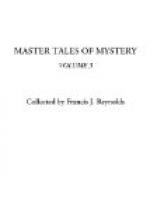“Already my suspicions had been aroused. I sketched the arrangement of the veins standing out on that hand. I noted the same thing just now on the hand that manipulated the fake apparatus in the laboratory. Despite the difference in make-up Scott and Prescott are the same.
“The invisible rays of the ultra-violet light may have blinded Mr. Haswell, even to the recognition of his own daughter, but you can rest assured, Prescott, that the very cleverness of your scheme will penetrate the eyes of the blindfolded goddess of justice. Burnham, if you will have the kindness to summon the police, I will take all the responsibility for the arrest of these people.”
THE SILENT BULLET
BY ARTHUR B. REEVE
“Detectives in fiction nearly always make a great mistake,” said Kennedy one evening after a conversation on crime and science. “They almost invariably antagonize the regular detective force. Now in real life that’s impossible—it’s fatal.”
“Yes,” I agreed, looking up from reading an account of the failure of a large Wall Street brokerage house, Kerr Parker & Co., and the peculiar suicide of Kerr Parker. “Yes, it’s impossible, just as it is impossible for the regular detectives to antagonize the newspapers. Scotland Yard found that out in the Crippen case.”
“My idea of the thing, Jameson,” continued Kennedy, “is that the professor of criminal science ought to work with, not against, the regular detectives. They’re all right. They’re indispensable, of course. Half the secret of success nowadays is organization. The professor of criminal science should be merely what the professor in a technical school often is—a sort of consulting engineer. For instance, I believe that organization plus science would go far toward clearing up that Wall Street case I see you are reading.”
I expressed some doubt as to whether the regular police were enlightened enough to take that view of it.
“Some of them are,” he replied. “Yesterday the chief of Police in a Western city sent a man East to see me about the Price murder—you know the case?”
Indeed I did. A wealthy banker of the town had been murdered on the road to the golf club, no one knew why or by whom. Every clue had proved fruitless, and the list of suspects was itself so long and so impossible as to seem most discouraging.
“He sent me a piece of a torn handkerchief with a deep blood-stain on it,” pursued Kennedy. “He said it clearly didn’t belong to the murdered man, that it indicated that the murderer had himself been wounded in the tussle, but as yet it had proved utterly valueless as a clue. Would I see what I could make of it?




